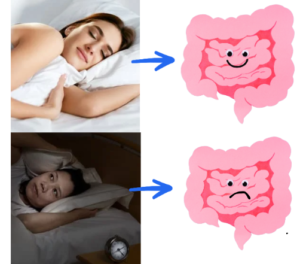Exploring the Essential Link Between Quality Sleep and Optimal Digestive Health
Sleep extends beyond just a period of rest; it serves as a cornerstone in influencing our digestive health. While the connection might not be immediately evident, the intricate interplay between sleep and digestion involves numerous physiological processes that work in harmony. The body’s circadian rhythm, often termed the internal biological clock, orchestrates both sleep cycles and digestive processes. This synchronisation is clearly observable in our bodies’ habitual signalling of hunger at specific times each day, highlighting how adeptly our systems align with these natural biological rhythms.
Recognising the Critical Importance of Restorative Sleep for Digestive Function 
Sleep is essential for the body’s natural ability to heal, rejuvenate, and restore itself. The deeper stages of sleep are particularly vital for these restorative functions. During these profound phases, the organs, tissues, and cells that make up the digestive system not only relax but also engage in crucial repair processes. The body prioritises cellular repair and growth during deep sleep, especially the regeneration of cells lining the digestive tract, which regularly endure wear and tear from food particles and digestive enzymes. This regeneration is pivotal in preserving the integrity of the gastrointestinal lining and enhancing the overall efficiency of digestion.
Deep sleep also plays a crucial role in bolstering the immune system, which is especially significant for the digestive system, as it houses specialised immune cells activated by beneficial bacteria residing in the gut. These immune cells are essential for defending the gut and the entire digestive system against harmful microorganisms, ensuring a balanced ecosystem of bacteria within the gut environment. This balance is vital for preventing digestive disorders and promoting overall health.
Furthermore, the organs within the digestive system play a critical role in the detoxification process, assisting in the elimination of waste and harmful substances from the body. Deep sleep enhances this detoxification by improving the functionality of the liver and kidneys, enabling these organs to operate at their best. This synergistic relationship between sleep and detoxification significantly contributes to the overall health of the digestive system and overall wellness.
Exploring How Sleep Patterns Impact Gut Motility and Digestive Efficiency
A fundamental aspect of digestion is the seamless movement of food and waste through the digestive tract, a process known as gut motility. This process undergoes significant changes during sleep. Throughout both deep and light stages of sleep, the rate of gut motility substantially decreases. This reduction is a necessary adjustment, allowing the digestive system to conserve energy, which is subsequently redirected towards repairing digestive tissues. This energy conservation is crucial for the digestive process to function optimally during waking hours, enhancing both nutrient absorption and efficient waste elimination.
The migrating motor complex consists of a series of contractions that occur during fasting periods, including while we are asleep. This cycle is essential for gut motility, as it effectively clears away food particles and debris that may linger in the digestive system. This natural cleansing mechanism of the digestive tract mitigates the risks of bacterial overgrowth, fostering a healthy gut environment. Importantly, the migrating motor complex is most active during the night when individuals are fasting and asleep, underscoring the critical role of sleep in maintaining the health of the digestive system.
As morning approaches, gut motility gradually increases, preparing the digestive system to efficiently process and digest food. This rise in motility can also trigger the first bowel movement of the day, exemplifying the finely tuned relationship between sleep and gut motility. Understanding this connection is essential for optimising digestive health and enhancing overall well-being.
Examining Hormonal Interactions That Influence Sleep and Digestive Health
Ghrelin, commonly referred to as the hunger hormone, plays a crucial role in stimulating appetite. Conversely, leptin serves to signal the brain that the stomach is full, helping to mitigate overeating. Together, these hormones are vital in regulating appetite; however, their functions can be significantly disrupted by inadequate sleep.
Merely one night of poor sleep can elevate levels of ghrelin, leading to increased appetite and often resulting in cravings for carbohydrates. This phenomenon is often described as feeling ‘hangry’. Furthermore, levels of leptin can decrease after a night of inadequate sleep, disrupting the signals that indicate fullness. This creates a challenging scenario where individuals may overeat and make unhealthy dietary choices while struggling to heed their body’s signals to stop eating. Although occasional poor sleep may not have severe repercussions, chronic insomnia can lead to significant digestive issues such as inflammation in the gut, liver disorders, gastroesophageal reflux disease, inflammatory bowel disease, and even colorectal cancer, in addition to contributing to weight gain.
Recognising the Serious Consequences of Sleep Disruption on Digestive Health
Interruptions in sleep can lead to a multitude of digestive issues. Factors such as shift work, particularly night shifts, alongside experiencing jet lag, can significantly disturb sleep patterns and disrupt the body’s internal clock. Additionally, late-night eating or irregular meal timings can adversely affect the quality of sleep. The circadian rhythm that governs sleep is closely linked to natural sunlight, which is essential for maintaining a healthy sleep-wake cycle.
Regrettably, in today’s technology-driven environment, many individuals spend a considerable amount of their daytime indoors, resulting in reduced exposure to natural light. This shift has led to increased exposure to blue light emitted from devices such as laptops, televisions, and smartphones, further disrupting the sleep cycle and sleep patterns, especially when this exposure occurs shortly before bedtime.
The cumulative effects of these factors can lead to serious digestive issues, including diarrhoea, ulcers, inflammatory bowel disease, or disruption of the delicate balance between beneficial and pathogenic bacteria in the gut. This imbalance can further compromise the gut lining, exacerbating issues related to digestive health.
Improving Microbiome Health Through Effective Sleep Practices
The microbiome refers to the trillions of microorganisms residing within the gut, primarily consisting of beneficial bacteria known as probiotics, alongside viruses, fungi, and potentially harmful bacteria. These microbes are integral not only for overall health but specifically for digestive health. They enhance the immune response and facilitate digestion, contributing to the production of essential vitamins, enzymes, hormones, and amino acids. Recent studies have accentuated a significant link between the microbiome and sleep, revealing that disturbed sleep or chronic insomnia can adversely affect the balance of these microbes, ultimately impacting digestive health and overall well-being.
Unpacking the Interconnected Relationship Between Microbiome Health and Sleep Quality 
The relationship between sleep and microbiome health is intricate and multifaceted. Inadequate sleep can negatively influence microbiome health, while an imbalanced microbiome can also detrimentally affect sleep quality. To comprehend this complex interaction, one study unveiled a correlation between a heightened presence of specific bacterial types in the gut and quicker sleep onset, alongside fewer awakenings during the night. Although this article cannot detail all findings, the primary takeaway is that nurturing a diverse and abundant population of beneficial bacteria in the gut is vital for achieving optimal sleep, effective digestion, and maintaining overall health.
Investigating the Interplay Between Stress, Sleep, and Digestive Health
A common outcome of stress and anxiety is disrupted sleep. Conversely, these mental health challenges can adversely impact the physical health and functionality of the digestive system. This disruption can lead to altered gut motility and contribute to issues such as indigestion, ulcers, and irritable bowel syndrome. A significant factor in this dynamic is the influence of the so-called stress hormone, cortisol.
Understanding the Impact of Cortisol on Digestive Processes
When cortisol levels rise, the body reacts by entering a fight-or-flight state. This physiological response leads to blood flow being redirected to vital areas such as the heart, brain, lungs, and muscles, while diminishing blood flow to the digestive system. This response prepares the individual to either confront danger or flee, a reaction that was critical for survival in ancient times.
In contemporary times, however, stressors are often less life-threatening, such as financial worries, work-related stress, or insufficient sleep. While short-term redirection of blood flow may be advantageous in acute situations, chronic stress can have harmful effects on the digestive system, particularly regarding gut motility. This can manifest in symptoms including constipation, diarrhoea, indigestion, gas, and bloating. Therefore, implementing effective stress management strategies is essential for supporting both gut health and achieving restorative sleep.
Ensuring adequate sleep is vital for maintaining a healthy digestive system, as the interdependence between sleep and digestion is inherently linked. Prioritising effective sleep hygiene practices is crucial for achieving restorative sleep. This encompasses minimising exposure to blue light from electronic devices, maintaining a regular sleep schedule, creating a cool, dark sleep environment, avoiding food intake within two hours prior to bedtime, and ensuring sufficient exposure to natural light during the day, particularly in the morning.
References
Understanding Digestive Health and Circadian Rhythms
Exploring Sleep Dysfunction and Digestive Conditions
Examining the Link Between the Gut Microbiome and Sleep
Investigating Stress and Its Effects on the Digestive System
The Article: How Sleep Affects Your Digestive System appeared first on https://janestevensnutrition.com
The Article: Sleep’s Impact on Your Digestive System Explained appeared first on https://janestevens.net
The Article Sleep’s Impact on Digestive Health Explained Was Found On https://limitsofstrategy.com



